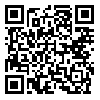Volume 18, Issue 5 (August 2020)
Nursing and Midwifery Journal 2020, 18(5): 369-378 |
Back to browse issues page
Download citation:
BibTeX | RIS | EndNote | Medlars | ProCite | Reference Manager | RefWorks
Send citation to:



BibTeX | RIS | EndNote | Medlars | ProCite | Reference Manager | RefWorks
Send citation to:
Goli R, jasemi M, Esmaeili R, khalkhali H. NURSING CODES OF ETHICS EDUCATION BASED ON LECTURE ON MORAL PERFORMANCE OF NURSING STUDENTS: A QUASI-EXPERIMENTAL STUDY. Nursing and Midwifery Journal 2020; 18 (5) :369-378
URL: http://unmf.umsu.ac.ir/article-1-4056-en.html
URL: http://unmf.umsu.ac.ir/article-1-4056-en.html
1- MSc, Department of medical-surgical nursing, School of Nursing and Midwifery, Urmia University of Medical Sciences, Urmia, Iran (Corresponding Author) , Rasoulgoli94@gmail.com
2- Assistant Professor, Faculty of Nursing and Midwifery, Urmia University of Medical Sciences, Urmia, Iran
3- MSc, Faculty of Nursing and Midwifery, Urmia University of Medical Sciences, Urmia, Iran.
4- Department of Biostatistics and Epidemiology, Inpatient’s Safety Research Center, Urmia University of Medical Sciences, Urmia, Iran
2- Assistant Professor, Faculty of Nursing and Midwifery, Urmia University of Medical Sciences, Urmia, Iran
3- MSc, Faculty of Nursing and Midwifery, Urmia University of Medical Sciences, Urmia, Iran.
4- Department of Biostatistics and Epidemiology, Inpatient’s Safety Research Center, Urmia University of Medical Sciences, Urmia, Iran
Abstract: (4813 Views)
Background & Aims: Nursing students as future nurses, are the largest provider of health services and will have a critical role in health care system. Therefore, with regard to the profession's importance, Nurses along with clinical competencies, should have ethical competencies to provide appropriate and professional care. Therefore, the present study was conducted to determine the effect of teaching Iranian nursing codes of ethics based on lecture method on moral performance of nursing students in Urmia nursing and midwifery faculty, 2019.
Materials & Methods: This study was a quasi-experimental research conducted with the participation of all Student nurses in semesters 6 and 8 (n=83) through census sampling and was divided into control group (semester 6) and lecture group (semester 8). Using the nurses' moral performance questionnaire a pre-test was performed of two groups before the Intervention. Ethics education was done in lecture group for three two-hour training sessions. The control group only received the training program of the faculty. After and two months after the intervention, the questionnaires w ere completed again by the two groups. Data were analyzed by SPSS 16 statistical software, independent t-test, Chi-square test, Mann-Whitney and Repeated measure ANOVA.
Results: According to the results, no statistically significant difference was found between two groups regarding the pretest mean score of moral performance(P>0.05), But after and two months after the intervention, the mean score of moral performance in the lecture group were significantly increased compared to the control group(P> 0.001).
Conclusions: Lecture method to ethics education is effective in promoting nursing students’ moral performance as a major contributor to providing better nursing care. It is, therefore, recommended that this method be used while imparting professional ethics.
Send email to the article author
| Rights and permissions | |
 |
This work is licensed under a Creative Commons Attribution-NonCommercial 4.0 International License. |






 gmail.com, unmf
gmail.com, unmf